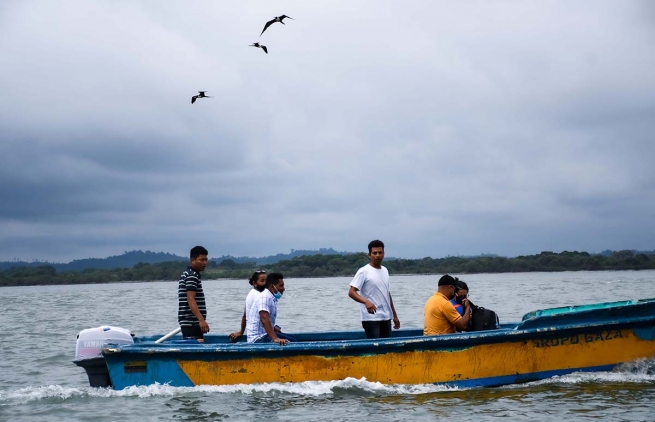ECUADOR: More than 8,000 families will benefit from new fishing project

Salesian Polytechnic University launches innovative fishing project that will benefit more than 8,000 families
(MissionNewswire) Salesian Polytechnic University, located in Quito, Ecuador, has launched an innovative fishing project that will benefit more than 8,000 families in the districts of San Vicente and Pedernales within the Salesian province of Manabí. The Italian Agency for Development Cooperation invested $2 million in this project to help mitigate the ecological impact of fishing in an ecologically sensitive natural environment.
The project is a collaborative effort of the University of Ferrara, Salesian Polytechnic University, and the municipal authorities of Manabí, Pedernales, and San Benedetto del Tronto, as well as Terra Di Siena Lab Blu Marine Service Cooperative and COSPE, a nonprofit organization.
An event was held in the Cojimíes fish ponds to kick off the first phase of the project, which will involve the fishing communities located along the estuary of the Cojimíes river, La Chorrera and Canoa. In addition, at the University of Ferrara and Salesian Polytechnic University, plans will be developed and implemented to reduce the environmental impact of the fishing and aquaculture sector. Salesians will introduce technological innovation and promote scientific and business knowledge within the traditional fishing sector.
In his speech at the event, Father Juan Cárdenas, rector of the Salesian Polytechnic University, underlined the collaborative and innovative nature of the project. “Our task, as a university, is not only to provide professional technical training, but also to truly educate and to help people build their life’s mission, so that we will have individuals who are capable of fulfilling their societal responsibility.”
Caterina Bertoloni, the Italian ambassador to Ecuador, highlighted the social and environmental impact of the project, which will also contribute to reducing the effects of climate change and promote employment of women and young people in the fishing sector utilizing traditional methods in Manabí.
Jéssica Quiñonez, representative of the beneficiary communities, said, “One of the qualities of us fisherfolk is patience since no one could fish in anger. We are strong and courageous. This project opens up a horizon of hope and motivates us to continue in the struggle with hope. We are fisherfolk since birth. We go out to sea in good and bad weather for the love of our family. I know this project will be a success and will cross borders.”
Ecuador is one of the most inequitable societies in the world, according to UNICEF. The richest 20 percent of the population receives almost 50 percent of the national income, while the poorest 20 percent receives only 5 percent. According to the World Food Program, almost 26 percent of all children under age 5 have stunted growth, increasing to 31 percent in rural areas and 47 percent in Indigenous communities.
Close to 20 percent of Ecuador’s population is people of Indigenous heritage. For poor, rural and Indigenous youth, education provides the best opportunity for finding employment, reducing inequities and breaking the cycle of poverty. Salesian missionaries have been providing education and other social programs for disadvantaged youth across Ecuador for more than 125 years.
###
Sources:
ANS Photo (usage permissions and guidelines must be requested from ANS)
Salesian Missions – Ecuador
UNICEF – Ecuador





